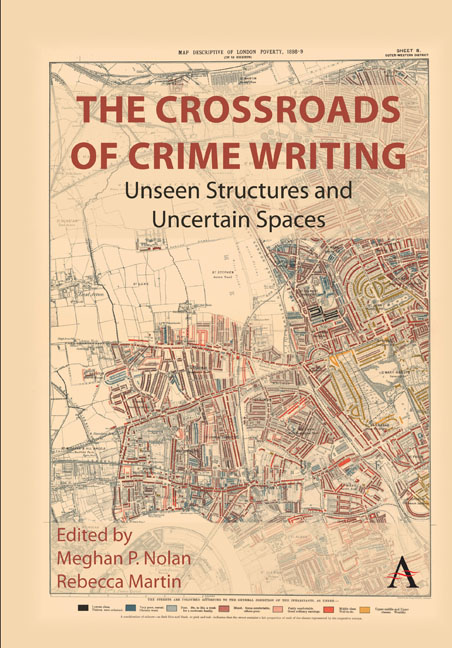Book contents
- Frontmatter
- Contents
- Introduction
- Unseen Structures
- Chapter 1 Unseen Structures and the Outlaw: Depictions of Violations in Stieg Larsson’s Millennium Trilogy
- Chapter 2 Dark Waters: Eco-Noir in New York 2140
- Chapter 3 Between Lenin and Sherlock Holmes: Soviet Militsiya Procedural in Volodymyr Kashin’s Detective Fiction
- Chapter 4 Detecting Justice: Black Crime Fiction and the Novels of Attica Locke
- Chapter 5 The Police and the Private Eye: The Making of Gendered and Racial Peripheralization in the Crime Fiction of Valerie Wilson Wesley
- Uncertain Spaces
- Chapter 6 Navigating the Carceral City: Calcutta in Late Nineteenth-Century Narratives of Detection
- Chapter 7 Traversing the Borders of Poverty and Morality: The Intersection of Maps and Upper-Class Ethics in Anne Perry’s Neo-Victorian Series
- Chapter 8 Facts and Fictions: The Liminal Space Between True Crime and Crime Fiction
- Chapter 9 The Success(Ion) and Corruption of Crime Genres in Jo Nesbø’s Macbeth (2018)
- Chapter 10 The Golden Age Meets the Age of Aquarius: Agatha Christie in the 1960s
- Notes on Editors and Contributors
- Permissions
- Index
Chapter 7 - Traversing the Borders of Poverty and Morality: The Intersection of Maps and Upper-Class Ethics in Anne Perry’s Neo-Victorian Series
Published online by Cambridge University Press: 13 April 2024
- Frontmatter
- Contents
- Introduction
- Unseen Structures
- Chapter 1 Unseen Structures and the Outlaw: Depictions of Violations in Stieg Larsson’s Millennium Trilogy
- Chapter 2 Dark Waters: Eco-Noir in New York 2140
- Chapter 3 Between Lenin and Sherlock Holmes: Soviet Militsiya Procedural in Volodymyr Kashin’s Detective Fiction
- Chapter 4 Detecting Justice: Black Crime Fiction and the Novels of Attica Locke
- Chapter 5 The Police and the Private Eye: The Making of Gendered and Racial Peripheralization in the Crime Fiction of Valerie Wilson Wesley
- Uncertain Spaces
- Chapter 6 Navigating the Carceral City: Calcutta in Late Nineteenth-Century Narratives of Detection
- Chapter 7 Traversing the Borders of Poverty and Morality: The Intersection of Maps and Upper-Class Ethics in Anne Perry’s Neo-Victorian Series
- Chapter 8 Facts and Fictions: The Liminal Space Between True Crime and Crime Fiction
- Chapter 9 The Success(Ion) and Corruption of Crime Genres in Jo Nesbø’s Macbeth (2018)
- Chapter 10 The Golden Age Meets the Age of Aquarius: Agatha Christie in the 1960s
- Notes on Editors and Contributors
- Permissions
- Index
Summary
Introduction
In many ways, the detective novel is about what desperation drives people to do, and this conception is amplified in and through areas where adversity abounds. As a result,
The city has long been the perfect backdrop for detective fiction, primarily because its contradictory qualities breed mysterious circumstances, particularly through an inescapable insistence upon socioeconomic separation and defined borders that is defied by a locality which does not in fact allow for such clear distinctions. (Nolan 2021, 104)
It is the very insistence upon the concreteness of neighborhood borders that fuels both the narratives and character development in (Neo-)Victorian crime writing, as they directly reflect the bourgeoisie's growing anxiety over uncertain spaces and “the ‘invisibility’ of the poor” by engineering the “socio-spatial visibility” of London's social castes in and through writing (Harputlu 2016, 41). And, in order to do this, they must build upon the actual sociopolitical cartographic efforts of the mid to late nineteenth century.
Charles Booth's Poverty Map (1889) printed as twelve sheets in the Map Descriptive of London Poverty in 1898–1899 (Figs. 1 and 3) provides the most important visual reference for the socioeconomic breakdown of Victorian
London's various districts. As Zeynep Harputlu notes in “Mapping Poverty in Late-Victorian Fiction”:
Charles Booth's comprehensive research on the condition of the poor can be conceived as a significant step in the identification and classification of the lower orders in the late-Victorian period. His thorough study remains a primary example of mapping the impoverished areas in the city and essentially focuses on scientific facts, economic behaviour and objectivity. In his works, Booth accentuated the “differences” and “deviancy” of the lower class members and contributed to the establishment of classifications and boundaries between social classes and urban spaces. (42)
Booth's meticulous detailing of the city based on economic activity further marginalizes the poor (even though that was not his aim) and thus provides a convenient backdrop for (Neo-)Victorian literature, which undoubtedly thrives at the intersection of the perceived borders of poverty and the unseen deeds of those crossing between said boundaries.
Information
- Type
- Chapter
- Information
- The Crossroads of Crime WritingUnseen Structures and Uncertain Spaces, pp. 153 - 168Publisher: Anthem PressPrint publication year: 2024
